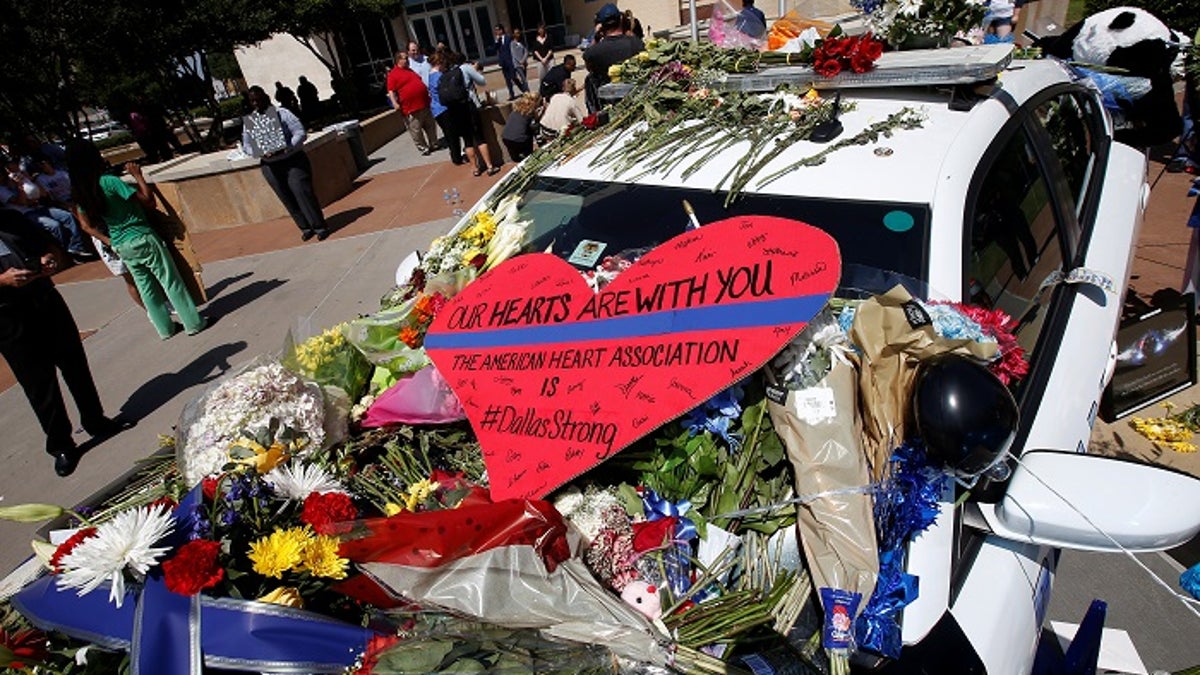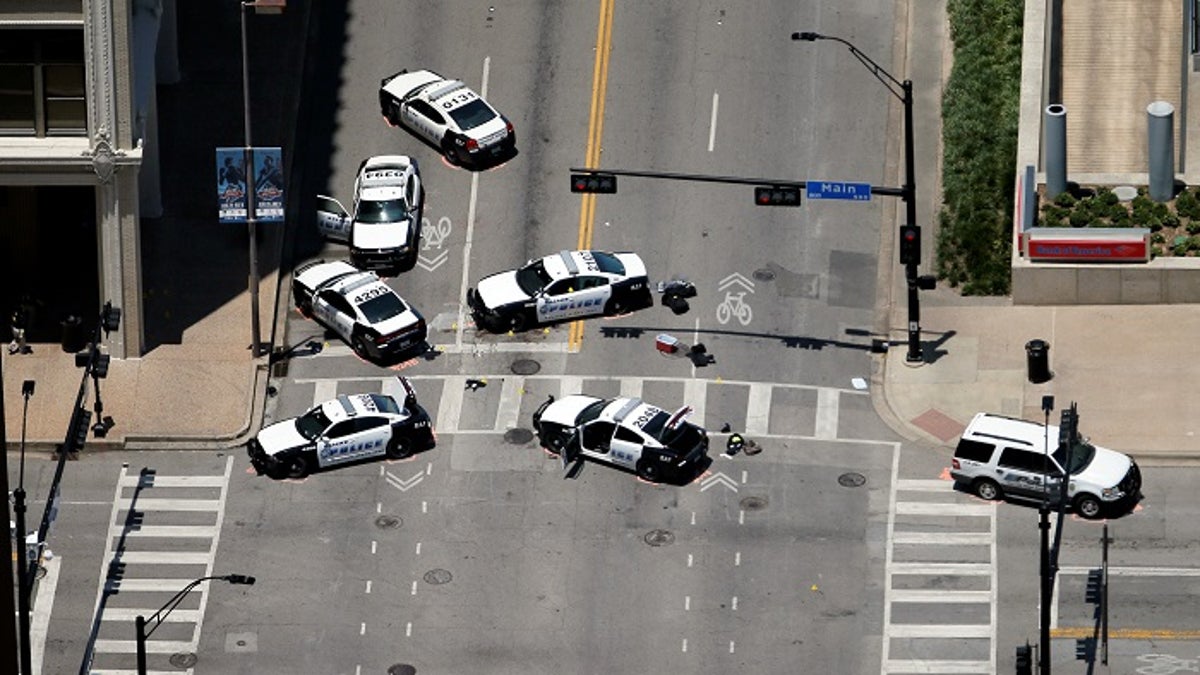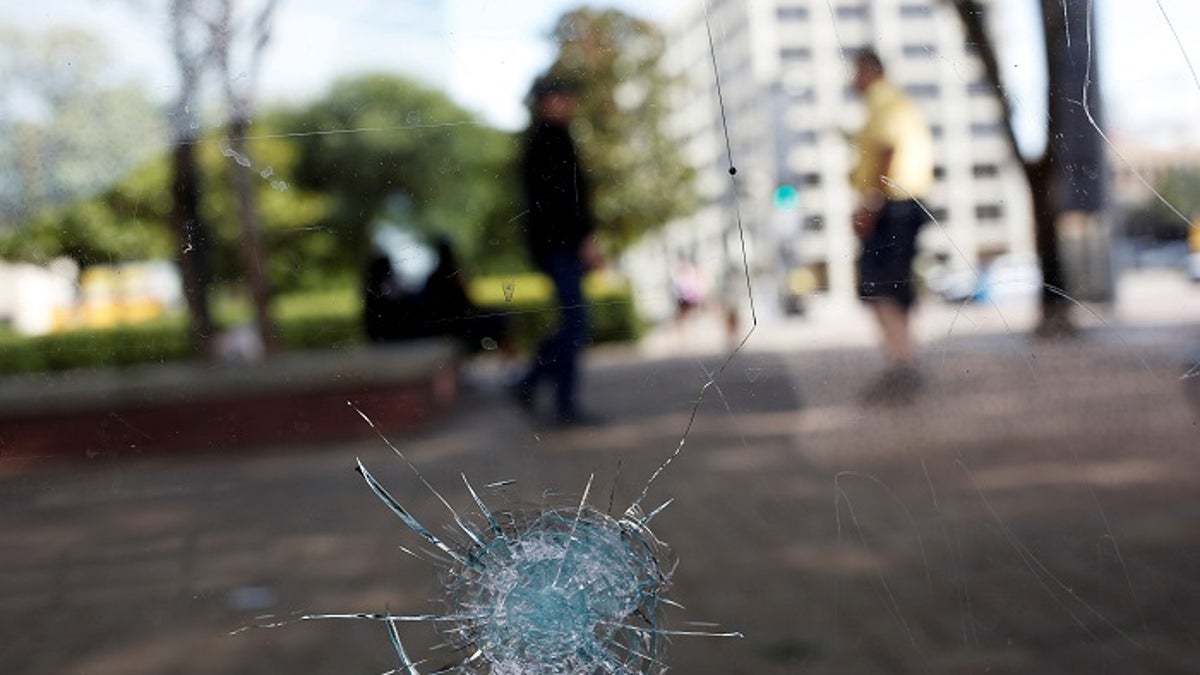
FILE -- A heart is pictured on a police car that makes up part of a makeshift memorial at Police Headquarters following the multiple police shooting in Dallas, Texas, U.S.,July 8, 2016. (REUTERS/Carlo Allegri)
This Friday marks one year since the single deadliest day for law enforcement since September 11, 2001. On July 7, 2016, Micah Xavier Johnson murdered five Dallas police officers during a peaceful Black Lives Matter protest.
I remember being called in for duty and arriving downtown to find a war zone. Blood soaked the ground near bullet-riddled police cars. Shell casings and broken glass were strewn everywhere, and shoes had flown off of protestors as they fled from the gunfire. Across America, men and women in uniform grappled with our new reality. After volunteering to serve in one of the world’s most dangerous professions, officers would now be targeted, attacked, and killed for no other reason than wearing a badge.
One year later, as our nation absorbs yet another lethal, unprovoked and senseless attack on law enforcement with the murder of New York City police officer Miosotis Familia, policing remains one of the most underappreciated and misunderstood professions in modern society.

Law enforcement personnel investigate a mass shooting scene at El Centro Community College at the intersection of N Lamar St. and Main St. after an attack which killed and wounded Dallas police officers, in Dallas, Texas, U.S., July 8, 2016. REUTERS/Brandon Wade TPX IMAGES OF THE DAY - RTX2KEX4 (REUTERS)
Less than one percent of the population truly understands what we do, how we do it, and why we do it. Police officers are responsible for enforcing laws, preventing crime, and ensuring public safety. The additional expectations placed upon us – up to and including getting killed in the line of duty - are excessive and unrealistic. There are significant risks inherent to our profession, but we expect to go home to our families at night; we don’t expect to die in a hail of bullets. One of my closest friends, the late Navy SEAL Chris Kyle, once told me, “In the military, you deploy for six months and then come home to safety. Police officers are deployed 24 hours a day, seven days a week, 365 days a year.”
The protesters who claim we’re trigger-happy thugs and chant “F—k the police” are the first to dial 9-1-1 if their lives, or that of their loved ones, are threatened.
Most officers don’t understand the animosity toward our profession. We’re all volunteers, working long hours in dangerous conditions for modest pay. Every day is a life-or-death crapshoot. We choose to do it because it’s our path to service. I’ve had the privilege of working alongside the bravest, most selfless people in the world. The protesters who claim we’re trigger-happy thugs and chant “F—k the police” are the first to dial 9-1-1 if their lives, or that of their loved ones, are threatened. When the gunfire erupted on July 7, no one refused help from the Dallas police officers who served as human shields and herded people to safety.

Broken glass from a bullet hole is seen at a bus stop near the shooting scene in Dallas, Texas, U.S., July 8, 2016. REUTERS/Shannon Stapleton - RTX2KEY1 (REUTERS)
Informed debate about policing is important; that’s the hallmark of our democracy. When citizens exercise their right to free speech, you’ll find a police presence along the protest lines to ensure that people stay safe while their voices are heard. Officers found guilty of wrongdoing should also be held accountable for their actions. We all have to do the right thing - badge or no badge. Although most officers aren’t part of the problem, we’re trying to be part of the solution. Reasonable discourse can take place without putting the entire profession on trial and further endangering our lives with inflammatory rhetoric and calls for violence against police. Our work is precarious enough already, as evidenced by the 31 Dallas Police Dept. officers who were killed during my three decades on the job.
Law enforcement needs the support and cooperation of the American public to effectively carry out our responsibilities. Many citizens do appreciate the police, but the vocal minority is loud, and the silent majority doesn’t come to our defense. A better understanding and humanization of the profession can help combat the anti-police climate. It’s a two-way street. Police departments must develop strong relationships within their communities and create opportunities to educate the citizens they serve. The public can do its part by informing its perceptions with reality – participate in your local police department’s community programs and events, stop and talk to an officer, and learn about police services.
Police officers will always be human beings watching inhuman things. In an average day on the job, we’ll witness more tragedy and crimes against humanity than most people will see in a lifetime. July 7, 2016, was one of those days. I’m so proud of the Dallas Police Department and the heroism of every officer who responded to the crisis. The five men we lost served with courage and honor. We will never forget them.
In memoriam: Sgt. Michael Smith, Dallas Police Dept.; Sr. Corporal Lorne Ahrens, Dallas Police Dept.; Officer Michael Krol, Dallas Police Dept.; Officer Patrick Zamarripa, Dallas Police Dept.; and Officer Brent Thompson, Dallas Area Rapid Transit Police.




















